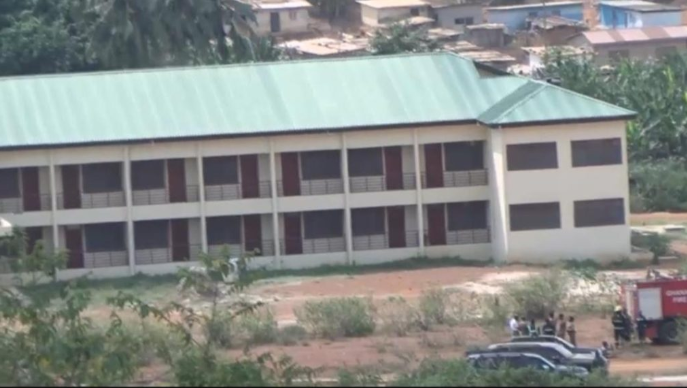adverts
President John Dramani Mahama has instructed the Minister of Fisheries and Aquaculture Development, Emelia Arthur, to collaborate with the finance minister to secure the necessary funds for the completion of the long-abandoned Anomabu Fisheries College in the Central Region.
The project, initiated by the National Democratic Congress (NDC) government in 2011, was left incomplete after Mahama exited office in 2017. The college, located in Anomabu, was designed to enhance sustainable fishing practices and aquaculture education.
The facility includes lecture theatres, a principal’s bungalow, fish ponds, boreholes, and a water pumping station, with the capacity to accommodate 300 students.
adverts
During his Thank You tour of the Central Region on Thursday, February 6, Mahama reaffirmed his commitment to completing abandoned projects, regardless of the government that initiated them.
He emphasised that the Anomabu Fisheries College was near completion, with only furniture, teaching materials, and campus roadworks remaining before it could be opened for students.
“This is why we promised to complete all abandoned projects, whether started by the NPP or the NDC,” Mahama stated. “We will secure the necessary funds to finish it. The project is near completion—only chairs, tables, beds, and some campus roads remain to be done for the first phase. Fortunately, every government prepares a new budget, and the finance minister will present ours in Parliament this March.”
Mahama has, therefore, directed Fisheries Minister Emelia Arthur to take immediate steps in ensuring that the Finance Ministry allocates the required funds to complete the first phase of the project. Once the initial phase is completed, he added, plans will be made for the commencement of phase two to fully operationalise the institution.
The Anomabu Fisheries College, when completed, will serve as a major educational hub for training professionals in the fisheries and aquaculture industry. It is expected to offer specialised courses in marine biology, fishery management, aquaculture technology, and sustainable fishing practices, equipping students with the skills needed to boost Ghana’s fishing sector.
The facility will also provide hands-on training through its fish ponds and research stations, enabling students to gain practical experience in modern fishing techniques.
This initiative aligns with the broader goal of improving food security, creating employment opportunities, and ensuring the long-term sustainability of Ghana’s marine resources.
Stakeholders in the fisheries sector, including local fishermen, industry experts, and community leaders, have expressed optimism about the completion of the college.
They believe it will contribute significantly to addressing challenges in the sector, such as declining fish stocks, inadequate training, and outdated fishing methods.
As the government moves forward with budgetary allocations for infrastructure projects, the successful completion of the Anomabu Fisheries College will mark a crucial step in strengthening Ghana’s fisheries industry and fostering economic growth in coastal communities.
GOT A STORY?
Contact/WhatsApp: +233243201960 or Email: manuelnkansah33@gmail.com


